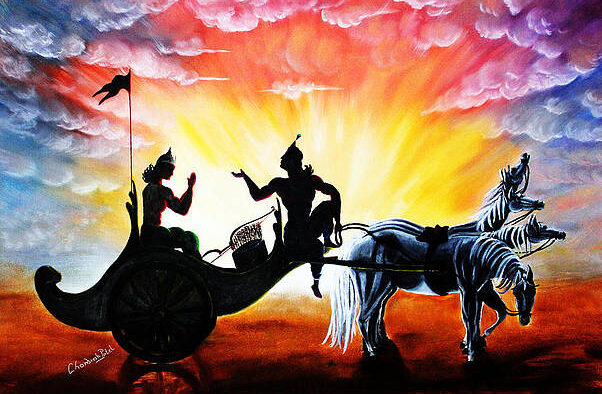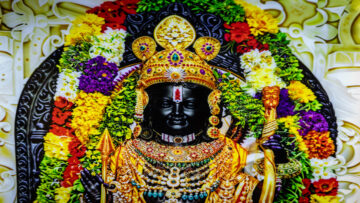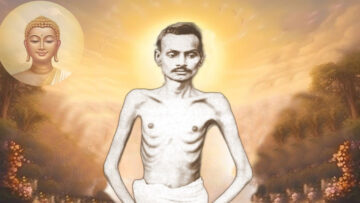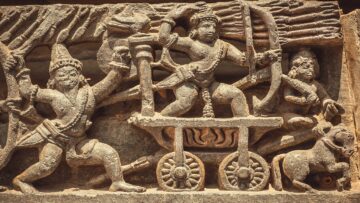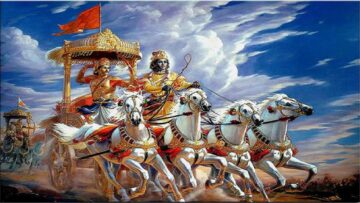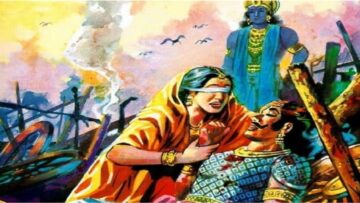The Gita has an exalted position within the corpus of Hindu shastras. It is one of the prasthana traya, the trio of Hindu texts that are the foundation of Vedanta—the Upanishads for Revelation (Shruti-prasthana), the Bhagavad Gita for Remembrance (Smriti-prasthana) and the Brahma Sutras for Reason (Nyaya-prasthana). On this special day, it is important to honour the Bhagavad Gita, to invoke and inculcate its spirit and teachings in our hearts and to pay our homage to Sri Krishna, the deliverer of the Song of God.
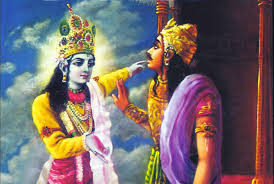 When we remember the Gita, we should remember it not as a dry, intellectual treatise but as a living dialogue, with the urgency and intensity of an epochal moment at the dawn of a great war, the greatest war the world will ever have seen, with the fate of one man’s soul and the destiny of humankind resting in the balance. In the few hours it takes to unfurl the dialogue of the Bhagavad Gita, what began as a conversation between a charioteer and a warrior, between two friends, becomes an intensely mystical experience, a communion between the Divine and the human that is every bit as intimate and loving as the exchanges between Sri Krishna and the gopis, just expressed and manifested in a very different way, a propounding of Dharma so sublime and wide-ranging that it has and never shall be rivalled or equalled.
When we remember the Gita, we should remember it not as a dry, intellectual treatise but as a living dialogue, with the urgency and intensity of an epochal moment at the dawn of a great war, the greatest war the world will ever have seen, with the fate of one man’s soul and the destiny of humankind resting in the balance. In the few hours it takes to unfurl the dialogue of the Bhagavad Gita, what began as a conversation between a charioteer and a warrior, between two friends, becomes an intensely mystical experience, a communion between the Divine and the human that is every bit as intimate and loving as the exchanges between Sri Krishna and the gopis, just expressed and manifested in a very different way, a propounding of Dharma so sublime and wide-ranging that it has and never shall be rivalled or equalled.
Imagine that you are Arjuna. The battle, the great war, for which you have been preparing your entire life, which you dreamt of all those cold nights sleeping on the forest floor while in exile, for which you went to Svarga itself to retrieve the necessary weapons, is about to commence. So many years spent in hiding, in wait, in humiliating exodus, at an end.
You stand on a magnificent chariot, yoked to resplendent white horses, bearing proudly the flag of Hanuman. The air is rent by the sound of the holiest and most powerful of conches being sounded in unison with bugles, trumpets, kettle drums and cow horns.
First, the eldest of the Kurus, the valiant grandsire, Bhishma loudly like a lion blows his conch to raise the spirits of Duryodhana, your principal foe. This ushers in the tumultuous sound of other conches and drums and trumpets. Sri Krishna and you let loose the roar of your divine conches, the Panchajanya for Sri Krishna and the Devadatta for you. Your brothers follow suit—Bhima sounds the Paundra conch; Yudhisthira the Anantavijaya; Nakula and Sahadeva, the Sughosa and the Manipushpaka, respectively. And the King of Kashi, wielding a great bow, the great charioteer Sikhandi, Dhrstadyumna, Virata, Satyaki the unconquered, Drupada and your sons from Draupadi and Subhadra, all of them together blow their respective conchs.
This sound is so thunderous and fierce, pervading the skies and the entire earth with its echoes, that the hearts of all of the Kauravas are pierced, including even Bhishma, Drona and other brave warriors.
For a few moments, everything is still and silent, before the tempest of the bloodbath begins. You see your uncle’s army arrayed before you, standing in position, all weapons poised and ready for warfare. Your mouth turns dry. It is not fear of war, for you have fought so many times, against even more powerful foes. But this is something different, something truly terrible and awesome.
Your eyes fall upon Sri Krishna, your dearest friend, your charioteer, the one who never fails to bring you comfort and succour. You look at Sri Krishna, and ask Him to bring you between the front lines of the two armies so that you may look upon those whom you are about to fight. He brings the chariot in the centre of the battlefield, in front of Bhishma and Drona and all the rulers of the earth. He says to you, “O, Partha, see these assembled people of the Kuru dynasty.”
All of the millions of pairs of eyes of the humans and beasts assembled on this great field are turned towards you. You see your beloved grandfather, your uncles, teachers, cousins, comrades, brothers, sons, fathers-in-law, comrades and friends, as well as so many strangers whom you have never met before. So many of them will die at your hand.
And suddenly, for the first time in your life, your valour deserts you. You lose your nerve. You begin trembling in despair with a sudden angst, a doubt that you have never known. You turn to Sri Krishna, and you begin to lament as you would to a friend, a confidante.
And after all, that is what he has been to you all this time—a friend. With him, you hunted in the Khandava forest. With Him and His wife, Rukmini, you and your wife, Subhadra, His sister, whiled away the few leisurely moments you enjoyed in this life. With you, He could laugh and relax as with no one else. With Him, you have a bond you have never shared with any other, not even your brothers. You do not yet know that you two together are the divine duo, Nara and Narayana, yet the connection is irresistible, undeniable. He is not a god yet, not to you. In His own lifetime, hardly would He be accepted as a prince, let alone an avatar, the supreme avatar, of Vishnu. Yet He has been the sole refuge, the saviour, the only one on whom you and your family can depend.
And so you turn to Sri Krishna, and you say that you do not want any of this, that you cannot bear to kill these people, that nothing good can come of it for anyone. You say, O Janardana, although these men, their hearts overtaken by greed, see no fault in killing one’s family or quarrelling with friends, why should we, who can see the crime in destroying a family, engage in these acts of sin? Better for me if they, weapons in hand, were to kill me unarmed and unresisting on the battlefield. You carry on in this way for a while before finally casting aside your bow and arrows and collapsing on the chariot, overwhelmed by grief.
Sri Krishna looks upon you with such soft eyes, such compassion, and you wait for the balm of His comfort and consolation. So it is all the more a shock, a dousing of cold water, when He speaks such hard words, berating you as a coward, as less than a man. His words pierce you like arrows. He says, “Yield not to unmanliness, Arjuna; this does not befit you. Shaking off this weakness of the heart, arise, O scorcher of enemies.”
Gone is your friend, the one with whom you could joke and laugh so easily, replaced by this implacable divine figure, an unyielding force of power, the resplendence of Vishnu himself in the guise of Yogeshwara Krishna.
And yet you cannot stop yourself from asking the questions, that tumble out of you one by one. Each and every doubt you ever harboured, each uncertainty that gives you pause, you begin to question and you cannot stop. He answers rapid-fire and expounds the most beautiful, the most sublime philosophy, beyond anything you had ever conceived. Sometimes He is gentle with you, and sometimes rough with impatience. Sometimes He is your friend again, and sometimes He castigates you like a father would a misbehaving son.
It is not a smooth exchange. You have so many questions, so many doubts, and His words are like quicksilver, hard to catch, even harder to hold onto. Your mind is dense. Philosophy only goes so far. There is only so little your mind can capture and retain. He senses this, too, that philosophy will no longer work.
You begin to wonder who is He, this one who has always been your friend but is now obviously so much more. And so He begins to tell you. He says—
I am the Self, O Gudakesha, seated in the hearts of all beings! I am the beginning, the middle and also the end of all beings.
(Ahamaatmaa gudaakesha sarvabhootaashayasthitah;
Ahamaadishcha madhyam cha bhootaanaamanta eva cha (BG 10:20)).
Among the (twelve) Adityas, I am Vishnu; among the luminaries, the radiant sun; I am Marichi among the (seven or forty-nine) Maruts; among stars the moon am I.
(Aadityaanaamaham vishnur jyotishaam raviramshumaan;
Mareechirmarutaamasmi nakshatraanaamaham shashee (BG 10:21)).
…
Among the great sages I am Bhrigu; among words I am the monosyllable Om; among sacrifices I am the sacrifice of silent repetition; among immovable things the Himalayas I am.
(Maharsheenaam bhriguraham giraamasmyekamaksharam;
Yajnaanaam japayajno’smi sthaavaraanaam himaalayah (BG 10:25)).
Among weapons I am the thunderbolt; among cows I am the wish-fulfilling cow called Surabhi; I am the progenitor, the god of love; among serpents I am Vasuki.
(Aayudhaanaamaham vajram dhenoonaamasmi kaamadhuk;
Prajanashchaasmi kandarpah sarpaanaamasmi vaasukih (BG 10:28)).
I am Ananta among the Nagas; I am Varuna among water-deities; Aryaman among the manes I am; I am Yama among the governors.
(Anantashchaasmi naagaanaam varuno yaadasaamaham;
Pitreenaamaryamaa chaasmi yamah samyamataamaham (BG 10:29)).
And, I am Prahlad among the demons; among the reckoners I am time; among beasts I am their king, the lion; and Garuda among birds.
(Prahlaadashchaasmi daityaanaam kaalah kalayataamaham;
Mrigaanaam cha mrigendro’ham vainateyashcha pakshinaam (BG 10:30)).
Among the purifiers (or the speeders) I am the wind; Rama among the warriors am I; among the fishes I am the shark; among the streams I am the Ganga.
(Pavanah pavataamasmi raamah shastrabhritaamaham;
Jhashaanaam makarashchaasmi srotasaamasmi jaahnavee (BG 10:31)).
Among creations I am the beginning, the middle and also the end, O Arjuna! Among the sciences I am the science of the Self; and I am logic among controversialists.
(Sargaanaamaadirantashcha madhyam chaivaaham arjuna;
Adhyaatmavidyaa vidyaanaam vaadah pravadataamaham (BG 10:32)).
…
Whatever being there is that is glorious, prosperous or powerful, that know thou to be a manifestation of a part of My splendour.
(Yadyad vibhootimat sattwam shreemadoorjitameva vaa;
Tattadevaavagaccha twam mama tejom’shasambhavam (BG 10:41)).
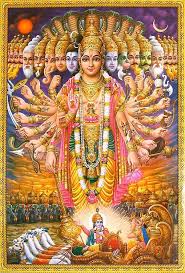 You are astounded, overwhelmed. Yet, it is not enough. You are overcome by desire to see His Cosmic Form. In His infinite kindness, He grants you the yogic vision with which to behold His supreme divine form. Even Sri Radharani and the gopis were not so blessed to have this darshana.
You are astounded, overwhelmed. Yet, it is not enough. You are overcome by desire to see His Cosmic Form. In His infinite kindness, He grants you the yogic vision with which to behold His supreme divine form. Even Sri Radharani and the gopis were not so blessed to have this darshana.
And what a glorious vision! There He stands before you, with numerous mouths and eyes, numerous divine ornaments and weapons uplifted, wearing divine garlands and anointed with fragrances, endless, with faces on all sides. If the splendour of a thousand suns were to blaze out at once in the sky, such would be the splendour of this Krishna. You are filled with wonder, your hair stands on end, your skin covered in goose bumps. You bow down your head to Him and say that you see in Him all the gods, all the sages, all the celestial beings—the Rudras, Adityas, Vasus, Visvedevas, the Asvins, Maruts, the manes and the hosts of celestial singers. You see Him with the diadem, the club and the discus, blazing all around, burning like the fire and the sun, immeasurable. He is infinite in power, of endless arms; the sun and the moon are His eyes; the burning fire, His mouth, heating the entire universe with His radiance. He alone fills the space between the earth and the heavens and all the quarters. The three worlds tremble in fear to see His wonderful and terrible form. And so do you.
It is too much for you. You are overwhelmed and frightened and ask Him to return to His familiar form, and so He does. You are shaken, yet you continue with your questions, with the dialogue. Like this it goes on for what seems to you to be an endless stretch of time, but in reality, it lasts for less than a few hours. Finally, He says to you, “Thus, has this wisdom, more profound than all profundities, been imparted to you by Me; deeply pondering over it, now do as you like.” (Iti te jnaanamaakhyaatam guhyaad guhyataram mayaa; Vimrishyaitadasheshena yathecchasi tathaa kuru (BG 18:63)).
No Book of Job this, no one-sided diatribe by an angry god at a devotee who dares to question his authority, his righteousness, who dares to ask of him a reckoning. Sri Krishna’s occasional anger is at your ignorance, your inability to think clearly, not at your questioning of Him, not at your fundamental search for the secrets of the self and of life itself. He does not ask you to succumb to His authority as the god of all gods; He asks you to reflect, to deeply think, to rely on your own free will and independence of thought, to search your own mind for an answer now that the confusion has been removed. Ultimately, the decision is yours.
You look upon Him, at He who was once your charioteer, your friend, but who is now something more. He is your teacher now. For a moment, you surrender to Him in perfect saranagathi. This moment, this feeling will not last, but it is here now.
You say something that will become one of the most famous lines of the Gita itself, that will be repeated with reverence by millions of people aspiring towards the same devotion and surrender, this same sense of utter clarity that you feel at this moment.
You say, “Destroyed is my delusion as I have gained my memory (knowledge) through Thy Grace, O Krishna! I am firm; my doubts are gone. I will act according to Thy word.” (Nashto mohah smritirlabdhaa twatprasaadaanmayaachyuta; Sthito’smi gata sandehah karishye vachanam tava (BG 18:73)).
This feeling that Arjuna experiences in the final moments of the Gita does not last very long. In the fighting of the war, Arjuna again forgot who he was and who was Krishna. At the end of one of the final days of battle, Sri Krishna steered the chariot to a remote place and suddenly told Arjuna to dismount first. (Being the charioteer, it was Sri Krishna who had always dismounted first.) Arjuna was puzzled but obeyed.
Sri Krishna released the horses and dismounted. The banner of Hanuman vanished in an instant, and in just a few moments, the entire chariot erupted into flames and burnt to ashes. Sri Krishna explained, “Arjuna, this chariot has been attacked by so many different kinds of weapons. It is only because I had sat upon it during battle that it did not fall into pieces. Now it has been reduced to ashes upon My abandoning it after your success has been ensured.”
Hearing the words of Sri Krishna, Arjuna was humbled by how much he owed to Sri Krishna and was ashamed of his pride, his arrogant assumption that it was his valour alone that was winning the war for the Pandavas.
After the war has ended, Arjuna confesses to Sri Krishna that he had forgotten what He taught him when He espoused the Gita to him. Sri Krishna sternly tells him that the Gita was spoken from a very high state of absorption and that it would be impossible for Sri Krishna to repeat the Gita again. But, out of compassion, He proceeds to give him a summary of what He had said in the Bhagavad Gita, in a discourse known as the Anu Gita.
The lesson here is that even though Arjuna cannot in any way be said to be an uttama adhikari (a person of highest qualification for spiritual teachings and practice), even though he lapses again and again, it does not matter—one does not have to be perfect in order to have a moment of perfection. Increasing the frequency of such perfect moments is the work of sadhana or spiritual practice. Through that process, we evolve and attain mukti.
The dialogue between Sri Krishna and Arjuna gave birth to the most renowned philosophical tract and spiritual discourse in the world – the Bhagavad Gita. What transpires is so sublime, so powerful and inspiring, that it causes Sanjaya, the other most famous charioteer of the Mahabharata, to utter the famous concluding verse of the Bhagavad Gita:
“Yatra yogeshwarah krishno yatra paartho dhanurdharah;
Tatra shreervijayo bhootirdhruvaa neetirmatirmama”
(Wherever there is Bhagavan Krishna, the Lord of Yoga, and wherever there is Arjuna, the wielder of the Gandiva bow, goodness, victory, glory and unfailing righteousness will surely be there: such is my conviction. (BG 18:78)).
The uniqueness of the Gita is that it does not glorify Sri Krishna alone; it glorifies Arjuna also and the very process of dialogue and discussion between him and Sri Krishna. It does not treat Bhagavan’s words as prescriptions on a stone tablet but as a living dialogue between the individual human being and his or her ishta devata (chosen deity / form of Iswara for one’s personal worship).
And the question that leaves each of us to answer in our own lives is whether, in those turning points that will come in the Dharmakshetra of our lives, those times of momentous decisions, when the god of gods stands behind us and whispers wisdom into our ear—will we listen? Will we understand? Will we hesitate, or will we act?
(This article was first published by IndiaFacts for Gita Jayanti in 2015)
(Image credit: Chandresh Patel, fineartamerica.com)
Disclaimer: The opinions expressed in this article belong to the author. Indic Today is neither responsible nor liable for the accuracy, completeness, suitability, or validity of any information in the article.

